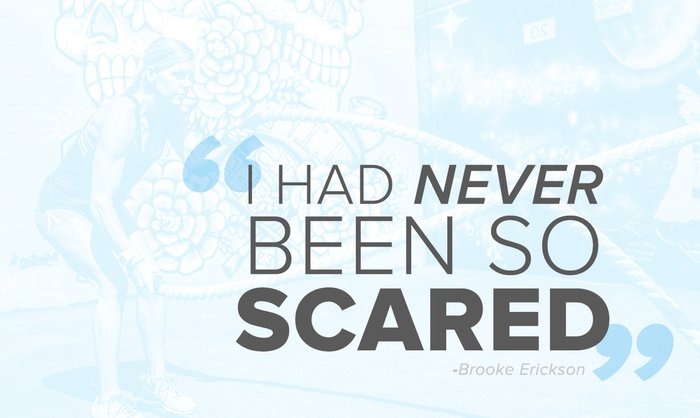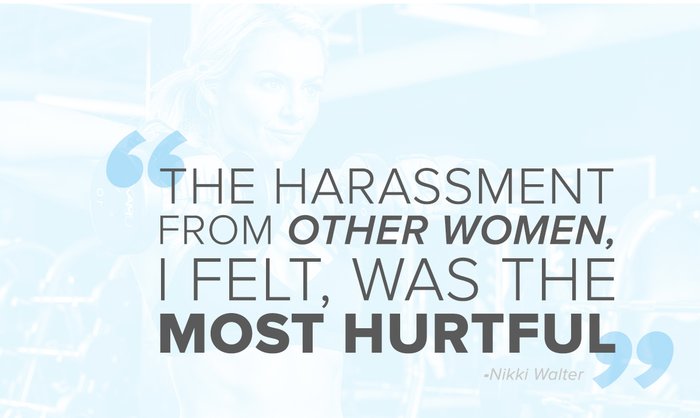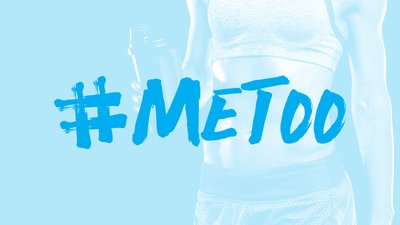Being a woman in the fitness industry is tricky. If you want to be successful on the stage or in social media, showing your booty is definitely one way to do it. However, you may also get a lot of attention and harassment you may not be ready for.
This paradox is nothing new. But, as sexual harassment scandals continue to rock the worlds of entertainment, politics, and workplaces around the country, it's easy to overlook how long unwanted advances—and stalking, and threats—have been an unfortunate part of women's quests to build their bodies.
Read even a few comments on a model's Instagram account, and you'll see the bind that she's in—and that we're all in. We've suffered for our muscles and our sleek curves, and our fellow fit women often want to see the results for education and inspiration. We want to feel proud and beautiful and show our confidence to the world. We don't want to have to hide because a few individuals don't know how to control themselves.
So how do we deal—and how should we deal? I reached out to a range of Bodybuilding.com athletes and other women in the fitness industry to share their stories and opinions on harassment and whether they believe it's a necessary evil of a body-obsessed industry. Here's what they had to say.
Harassment is common, but it's not universal
I was pleasantly surprised to discover that not everyone has experienced lewd comments, inappropriate remarks, or overt harassment.
"I have been extremely fortunate and blessed to have not dealt with sexual harassment in the fitness environment," explained longtime Bodybuilding.com athlete Kathleen Tesori. "The comments I receive online have always been mild and appropriate."
About 15 percent of the ladies I contacted shared this sentiment and reported no personal experience with sexual harassment. On the other hand, the remaining 85 percent all reported some form of harassment in their careers, from comments to stalking and threats to outright assault. And it didn't always start with a few mildly inappropriate comments.
Easy targets for predators
Competing onstage or promoting yourself on social media as a fitness personality makes it much easier for everyone, everywhere to find you. And as your star power rises, so can the unwanted attention you receive.
"I got a phone call on my hotel room phone while I was resting between morning judging and the evening show at a competition," recalls Rachelle Dejean, a former NCAA Division 1 athlete and Bodybuilding.com team athlete. "At first I thought it was a friend playing some sort of joke. He said he wanted to ask me something, and proceeded to ask me a very lewd and inappropriate question. I was stunned. I was embarrassed. I quickly hung up."
Her anecdote is all too common. An online comment or question in a public forum, where you can easily "flag" or report it, feels like one thing; someone invading your personal space or calling you directly feels like another. For better and worse, the interconnectedness of the digital age often allows virtually anyone, anywhere, to get in touch with you.

"I experienced online sexual harassment that quickly turned into online stalking," remembers personal trainer and IFBB figure pro Brooke Erickson. "I will never forget getting my first private message from a man who had a clown face as his profile picture. He described in detail what he was going to do to me. It left me feeling like he knew where I lived and that at any given moment I needed to be ready for him to attack me."
Erickson blocked this individual, but he soon created another profile. He contacted her again, and the threats grew worse. "After reading his messages, my husband and I contacted the police. I had never been so scared, and the first thing the detective asked me was if I had protection."
Erickson's case was turned over to the FBI. It took them six months to trace her stalker's IP address, which meant six months of living in fear for Erickson and her family.
"Every noise I heard in the middle of the night would send me into a panic attack," she recalls. "When I would leave the gym, I would not let my girls walk without holding my hands, and I would wait for someone else I knew at the gym to leave so they could walk with us."
Such scenarios are disturbingly common—and a harsh reminder of how quickly "unwanted interest" can escalate into something downright terrifying.
Why fitness women's normal is not normal
Fit females can seem like an easy target for sexual harassment, simply because it is normal in our culture to post half-naked pics to show "progress."
We at Bodybuilding.com often recommend the progress pic as a way to get a more tangible marker of changes in your body than the fickle (and often misleading) scale. Sharing them or publishing them is, of course, up to you. But once you're a fitness professional of any type, it comes with an unspoken expectation that you will share more than normal.
Put more bluntly: "We accept that if we are in the industry, we expose our physique to the world," explains Bodybuilding.com athlete Nikki Walter.
Physique competitors and fitness models pack their social media accounts with skin-heavy progress pics, often daily. In an industry based on striving for—and glorifying—physical improvement, showing skin can feel, well, necessary.
"To a fitness person who 'gets it' and understands the purpose of showcasing changes in our physique, showing lots of skin is ordinary," explains Dejean. "But to anyone else, it might be the catalyst for the unwarranted and unwanted sexual comments."
This level of nakedness often doesn't feel sexy or provocative when we click "post." But someone not familiar with fit culture may not see it that way.
"When we share any type of body-related content—fitness clothing, swimsuits, etc.—it makes us an approachable target, even when the content we share is appropriate and unsuggestive!" says Dejean.
The fine line between fitness and sex
Of course, the type of non-sexualized content Dejean describes is just one type of fitness photo. Scroll through your fitness inspiration feed, and you'll see plenty of toned, athletic bodies promoting exercise, clean eating, and healthy lifestyles.
Then you come across a photo with a highly provocative pose, and incredibly revealing clothing, and suddenly you're wondering if that's what being a fitness model is all about.
"The line that used to sit between what is too sexy, what is appropriate, and what is simply fitness has been seriously blurred," explains Dejean. "I find myself stumbling across 'fitness' photos that make me cringe—the ones that that are so obviously lacking any relation to fitness whatsoever."

Sex sells, right? And for many women, images like these are also inspirational and important. They're proudly owning their sexuality. They're not hiding. But, it also makes the conversation more complicated. Understandably, more fitness-focused models have mixed opinions about highly sexual fitness photos.
"I feel like by even attaching the word "fitness," it opens the door for sexual harassment, fantasy, and all of the other violating things that go with it," explains Erickson. "I know there are plenty of women who feel nudity is an expression of their proud and confident message, but I also feel nudity has become a part of the problem. We need to draw the line somewhere and take a firm stance against our bodies being seen as prey."
The bottom line: It's not up to me, these models, or anyone but you to decide what you want to post. But realize that regardless of the spirt in which you publish them, sexualized images done in the name of fitness will probably make it more likely that you receive a sexual response. As fit women, it's up to us to be mindful of the images we portray on social media.
Fans are not the only predators
As John Goodman mentioned in his article discussing trainers in the #MeToo era, the close relationships between competitors, coaches, and judges breeds a sense of trust that can easily be abused. Whether it's a coach getting too close to a client, a gym owner abusing authority over a trainer, or a judge propositioning a competitor, women in the fitness industry have more to worry about than just the fans.
"I am very grateful that I work with fitness coaches and trainers who I have a mutual respect with," explains Dejean. "It breaks my heart to hear about women who trusted their mentors, were mentally and physically hurt by them, and were too afraid and broken to speak up."

Several of the women I contacted indicated that the intense emotions and ambitions of fitness competition culture make it especially prone to abuse. "I have to say that out of all things fitness, competing has the darkest sexual side," admits Erickson. "I've known girls who take off their clothes for placings, and I've heard stories of the 'closed door' meetings with some of the biggest names in the industry."
The problem is so well-known that many coaches warn their clients ahead of time as a normal part of show prep. "Several of my girls have been approached by judges and photographers for reasons unrelated to competition," explains IFBB bikini pro and competition coach Nicole Moneer. "Dealing with that kind of inappropriate behavior is something I have to coach them on."
But harassment doesn't always come from the powerful and influential. Sometimes the most hurtful behavior comes from those who don't understand, don't respect, or simply don't like a competitor's choice of sport or the goal they've dedicated themselves to.
"The harassment from other women, I felt, was the most hurtful," explains Walter. "Comments that my new journey's purpose was just to display my body, and that it was socially unacceptable—they thought I was using my sexuality to accomplish goals and get attention."
Cutting through the noise
The question remains: What can we as women do to change or control this problem? Although there is no singular, perfect solution, the women I contacted were adamant that every one of us can take steps to avoid harassment and end abuse.
"I stopped experiencing sexual harassment the moment I stopped acting like a victim," explains fitness model and coach Dr. Sara Solomon. "It was the moment I stopped relying on other people for my career advancement, and instead decided to build myself by building my inner and outer strength."
"I ignore the comment, delete, and block," says IFBB bikini pro and Bodybuilding.com athlete Katie Chung Hua. "If it's bad enough, I'll try and report it."
"It really is up to us women to project what we want confidently, in social or online settings," says Walter. "Our response to situations, even when they are unexpected or unwelcome, is the only thing we can control. Stay confident in your purpose for creating a better you, and it will make a profound impact for you—and inspire others."
What happens when someone does cross the line? Do you report it? Press charges?
"I think a lot of women don't understand what constitutes sexual harassment or abuse," says Moneer. "I've talked to police officers, I've talked to former judges—it's kind of a grey area, and these cases are really hard because often there are no witnesses."
When this happens, the athletes told me, don't keep it to yourself.
"Whether or not we can avoid harassment, we can join together to support each other, empower each other," says Dejean. "No woman should have to just 'deal with it' and 'let it happen.' I wish I had shared my story with more people then—to connect with others who might have dealt with the same."

Moneer also has a little advice before you ever make your first post. Namely, know why you're doing this in the first place. "One thing I found is a lot of people get into this for the wrong reasons," she says. "They may say they want to motivate and inspire, but a lot of people get into it to fill a void." If you want to be in the fitness game for the long haul, a little introspection and soul searching is worth its weight in gold.
"Speaking up is also huge," adds Moneer. "People need to speak up when they see someone doing something really, truly wrong. Some of these big players in the industry keep their unsavory behavior so well hidden, but the only way to do something about it is to speak up."
"As women that have a passion for the fitness industry, we need to rise up and speak the truth about the kinds of behavior and circumstances we are subjected to," says Erickson. "I have worked hard over the last eight years to be a positive influence for women, helping them find success without feeling like they have to go the sexual route. We refuse to be used or use our bodies in a sexual way that is disguised by the word 'fitness.'"
How do you deal with the noise, fit ladies? If you're comfortable sharing, let us know in the comments!

